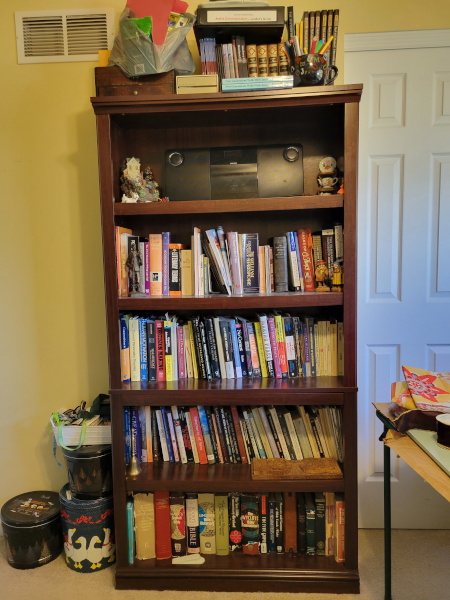Is Creativity and gain for a Few or the Many? Practical spirituality series
We have reached the point where population grows but there are few opportunities for creators. This raises a spiritual question: should we provide more opportunities for creative people who are highly talented, or just let companies dominate the market and keep them out? We can make it work for many if we want to.
Welcome to my Patheos and YouTube New Generations Explore Faith and Substack Our Times Today and Tomorrow spirituality series. The focus is on practical spirituality—that is, putting our spiritual beliefs into practice. (Links to the Substack podcast and YouTube video will be added here when available.)
Reading time for this serious, in-depth topic: 23 minutes.

Is this bookcase image derivative and in need of copyright protection to prevent AI from using it to create images of bookcases? I think the dust is unique to me. Should I protect the unique dust pattern?
Ancient times emphasized fairness in many cultures
Fairness in society isn’t a new idea. In the first ancient civilization to have writing, ancient Sumer, beginning 5500 years ago, they considered the questions of why treat people fairly? Who deserves to be protected in society, and to what extent? They codified their answers into law. They were admirable in their fair treatment of all for that time. – The Origins of Social Justice in Ancient Mesopotamia.
In the Near East, Hindu religions and Buddhist philosophy see all people as equal and part of the divine. Mistreating others is seen as gaining karmic consequences so buyer beware—mistreat others at your own risk.
Much of the Hebrew Bible and Jesus’ message, dating from around 1200 BCE, were about fairness in trade and society. There were things like allowing newlyweds to stay home for two years before military service. Merchants were not to cheat with rigged weight scales, and employers were to pay workers on time and fairly.
Many of the lessons from ancient Sumer and ancient Israel are needed just as much today in capitalist economic systems in which we tend to leave people out, especially if they are disadvantaged.
“And if you make a sale to your neighbor or buy from your neighbor, you shall not wrong one another.” Leviticus 25:14 (ESV)
“‘You shall not oppress your neighbor, nor rob him. The wages of a hired man are not to remain with you all night until morning.” – Leviticus 19:13 (NASB)
“A false balance is an abomination to the Lord, but a just weight is his delight.” – Proverbs 11:1 (ESV)
“Who does not put out his money at interest and does not take a bribe against the innocent. He who does these things shall never be moved.” – Psalm 15:5 (ESV)
“A just balance and scales are the Lord’s; all the weights in the bag are his work.” – Proverbs 16:11 (ESV)
“Wash yourselves; make yourselves clean; remove the evil of your deeds from before my eyes; cease to do evil, learn to do good; seek justice, correct oppression; bring justice to the fatherless, plead the widow’s cause.” – Isaiah 1:16-17 (ESV)
More verses about fair pay: Working For Fair Pay
There was also recognition of the world as it is, such as investing money and talents wisely for more gain. In Jesus’ parable of the talents, worker’s abilities were recognized, and each was given money to invest according to his ability. Fairness doesn’t mean we all have the same abilities.
Jesus apparently was a realist; he didn’t dismiss humanity’s governance and economic structures. I believe he left it up to us to improve the world we live in, which is our spiritual growth. He said, ““In everything, therefore, treat people the same way you want them to treat you, for this is the Law and the Prophets.” (Matthew 7:12 (NASB)) This is an open door and is in the spiritual realm.
Fairness in recent times – we find excuses not to be fair
We adjust our ways of doing things with the times. But when we do things that aren’t fair, regardless if it’s “just business,” what impact does that have on our souls?
In recent times, writers and actors have gone on strike to address monetary issues in a changing world. They’ve seen their income streams dwindle as technology changes the marketplace. Why should we let them change the rules? Why should we make things fairer for them? Who should be included and who should be left out?
Creativity is a daunting process
We all want the world to be fair. But what would fairness look like in the creative and performing arts industries? People want to be paid for their intellectual property. Creativity takes a lot of time, talent, experience, and effort. This investment by artists and performers is huge. Just getting to the level of audience acceptance is a huge investment and sometimes the returns are minimal.
Performing arts – Music
The statistics are a staggering paradox for those wanting to enter the creative market. In the music arena, Music Business Worldwide says roughly 120,000 songs are uploaded to streaming services daily. If you want to write and sell a song, the competition is massive.
Performing arts – Acting
In the acting world, according to Gitnux.com, fewer than 15% of actors hold full-time jobs in their profession, and only 12% earn more than $1000 a year. The profession is only expected to grow by 3% over 10 years, which doesn’t provide much new opportunity.
This paradox of limited demand for talent is wrapped in a cocoon of capitalist influence. Business is about making money. This is why business exists. Business isn’t even asked to be about anything else.
Book publishing
It’s also known (Google it) that 11,000 books are published each day. Unless writers advertise, no one even knows they exist. No one could ever have time to read all of these, and sorting through them is a major headache.
Movies
There are around 1500 movies produced each year. Hollywood produces nearly 700 of them. Streaming and cable channels produce others. Independent writers have major difficulty finding their way in because the industry looks primarily for successful experience. Out of 50,000 independent screenplays registered each year with the Writers Guild, only around 50 are purchased and fewer are made into movies.
Yet many of the writers who are ignored are highly talented and they’re not producing derivative mass market drivel. Many create very high quality stuff that never gets an audience.
The business of creativity
Fairness and helping society are distant voices at best and rarely influential. As long as business is involved, the “product” of creativity is restricted to certain individuals so that they can count on making a lot of money.
It isn’t necessary to demonize capitalism but we should be realistic about it and control it. Capitalism isn’t something that developed in nature or a divine commandment. There is no such thing as pure capitalism and much that came from an earlier era went out of existence in the late 19th Century. People created capitalism and we control it through regulation. If we want it to be inclusive, we can create regulations that do just that.
Recent technology developments have cracked open the market. Outlets like YouTube and self-publishing have made it possible for others to bring their talents to the marketplace. A small number are very successful there. But for most people, their creative product is simply another tree in a very dense forest.
Today we look at the challenges for creative opportunities in music, books, movies, software, and other intellectual property. Just the phrase intellectual property tells us a lot about our attitudes. It’s all about recognition and money.
A surprising fact is that neither big-name producers nor individuals are happy with the current state of things for getting recognized or making a living.
Why is this in the spiritual arena?
I see this as being in the spiritual arena for several reasons. The spiritual is partly about creativity. It’s about bringing new ideas into our world through inspiration and talent. Suppression happens to the bulk of prospective creators preventing them from making a living doing what they love or for which they have a major aptitude.
Systemic problem
It’s a systemic problem that requires a systemic fix. As a creator of fiction and nonfiction books, articles, podcasts, movies, graphic arts, poetry, and music, I feel the pain—I make next to nothing on these endeavors, but I feel compelled to do them for others’ benefit anyway. I’m also compelled to ask: can we make it better for everyone?
Realistically, we can’t give everyone talent. We can’t make everyone a market winner. The market is fickle, and it takes a long time to develop the talent to produce things that others want to enjoy. For creatives, that investment often comes without pay.
Who can capture a place in the market?
Not everyone has it in them to do a creative career. Of the 52% in the US who consider themselves creative, and the 81% who feel they have a book in them, the dedication required for research, writing well, and coping with the market is beyond them.
For many creatives, the struggle is between doing what they want and doing what the audience wants. Most creatives seem to decide doing what they want is paramount. So they live and produce in obscurity.
Copyright is an issue and a farce
In ancient times, roving bands wandered the countryside, telling stories and singing songs. If lucky, they had a bit of money given to them and may have stayed in people’s homes and eaten with them. Room and board have always been welcome payment. Anyone could sing their songs or tell their stories.
Shakespeare performed at the Globe and other local theaters in Britain in the 1500s. He was less likely to travel. Other playwrights across Europe did travel, but local theaters and local talent were becoming more common.
With the advent of recording technology, fame spread. Their recordings became intellectual property with copyright protection. You had to buy them or hear them performed live. You couldn’t play them for profit.
For books, the Copyright Act of 1790 in the US granted authors the exclusive right to publish and sell books, maps, and charts for 14 years. England was first with a copyright law in 1710, followed by a copyright law in 1777 in France. Most countries observe internal and international copyright laws. In today’s world, countries agree to a minimum of the author’s lifetime plus 50 years.
Why beyond the authors’ lifetime? To ensure profit for companies that own their rights. Copyright means little to authors; it just gives them a way to sell their work. The idea behind patents and copyright is business interests with a nod to consumer interests.
Protecting intellectual property for a few years makes it financially worthwhile for creatives and companies to create, refine, market, and distribute their products. It’s a way to make a living for creators and companies. That’s fair because creating and distributing takes huge effort and finances.
Without that protection, the guy next door would also produce the same product as would thousands of others, and people couldn’t make a living through creativity. And that’s become a problem again which I’ll discuss in a few paragraphs below.
Intellectual property rights also protect consumers. It encourages competition because the proposed product meets a need, and to enter this market, other companies have to create a better or less expensive product—they can’t just duplicate existing products under copyright or patent.
Recording business example
When I was in radio, music distribution services (AKA record labels) sent our station the latest releases. If we played them and they got popular, record sales would go way up. The industry briefly considered having radio stations pay a fee each time a recording was played, but I think they realized stations would just stop promoting their product. Getting greedy would kill the golden goose. However, they do get a royalty for MP3 streaming on Internet radio stations.
Music is an example of companies swallowing the market whole. If you want to play another artist’s song for profit, there is a swamp of rights you wade through. I list them on my Movie Stream Productions Web site.
I found that buying music rights simply isn’t worth it unless you really need a specific song—just get royalty-free music for a small fee. Even then, caution is required to make sure the music isn’t like something another artist recorded, and this may require a musicologist to screen the music. YouTube should make their music copyright screening system available for screening new music. They have it down to a science.
The goal of music companies is to make money, just like all other companies. Their contracts take the rights from recording artists forever so that they profit for the artist’s lifetime plus fifty years while only paying royalties to the artist.
Many recording artists have fought against this system. Some quit recording just to prevent music companies from benefiting from their music. One of the Beetles purchased the rights to their music catalog after being without it for decades. Musician Prince Rogers Nelson couldn’t even get his name back, so he became “The Artist formerly known as Prince,” to keep making and selling his music.
Taylor Swift, who is likely losing a fortune through streaming, re-recorded and released some of her vintage music to avoid the label that originally recorded it. Other artists are doing the same.
Capitalism gives some industrious individuals the opportunity to become very wealthy. We’re okay with that and even glorify it as a desirable feature of capitalism. It’s one of the things that gives capitalism strength lacking in other economic systems because entrepreneurs are rewarded for their effort. But is it okay to manipulate the system the way record labels and publishers do to keep other talented people out?
Book publishing example
The publishing world has always been the same in modern history. Book stores have limited shelf space … although book stores are fading into history. If you can capitalize on shelf space in a Barnes and Noble store or for food in the Walmart cookie aisle, you sell more for your company.
Create six products and flood the shelf space. (That’s an oversimplification but not far from true.) Market manipulation is very alive in capitalism – it rarely works by supply and demand the way people think it does. Supply is close to unlimited, especially over long periods.
Book publishers primarily want authors who can repeatedly create bestsellers. They will promote those books because they know they’ll be profitable. They have a catalog of books they offer each year, and to get into that catalog you have to displace someone who sells well.
They do accept a few promising authors, but recently some have been looking for people who have written several books and who will bring an email list of dedicated readers with them. These companies may even test market through independent channels.
What this means for authors and the reading public is that nonfiction authors must create books each year with incremental updates of information. Fiction authors must write the same type of book with similar characters every year. The public pays large prices to see only incremental gains.
This isn’t necessarily bad in fiction because many people like to read the same type of story over and over. This system locks in writers who are performance-oriented, doing the same dance over and over, while excluding others who have some new creative thing to offer.
Market manipulation is rampant
Not to divert too far into this idea of market manipulation, but retail companies offer products that generate more profit by placing them at eye level. Other products might be available if you reach high or low for them or if you order online. They make products available through their catalog that you will never see in the stores because they don’t make enough profit. Profits stay up while other products are excluded.
Technology creates opportunity and changes the market
Technology continued to improve the delivery of products with the Internet for books, MP3 audio, podcasts, and movie streaming. This was wonderful in that it removed some of the barriers faced by very creative people who had something wonderful to share but couldn’t produce it or get it to market. I do this myself.
This technology also created a forest in which hardly anyone’s products can be recognized without spending huge amounts of cash on advertising.
Technology wrecked the copyright financial system with MP3 streaming. Streaming companies divide revenue evenly between all artists or companies and keep a big share for themselves. So songs that are popular earn the same revenue as songs that get no plays.
Most companies earn 8% profit each year (income minus expenses and taxes). YouTube is estimated to rake in a gross profit margin of ~38%. While eye popping and seemingly unfair, this is signficantly lower than other technology competitors such as Meta (Facebook, Instagram) with ~80% margin.
Podcast competition
With thousands of creative products released each day, including five million podcasts globally, do the math. It’s extremely challenging to get noticed in this massive forest of new entertainment media.
Book and movie competition
I sell a few books. When I produced movies, I saw that I confronted a forest of independently produced movies. People had to hunt for us to find us. And if you hunt for a title on Amazon, their algorithm will show you similar popular-selling titles first, not the specific one you’re looking for.
The only way to be found by an audience is to dump huge amounts of money into advertising. It’s very likely the cost of advertising will swamp all revenue, leaving myself and others with a substantial loss. Others I would have shared revenue with would get nothing. This is hugely disappointing for creators and extremely frustrating for new creators who don’t understand that the system isn’t set up to work for them.
Only so many at the top
As populations have grown and the distribution of media content has become ubiquitous, we’ve developed a curious phenomenon. No matter how much the population grows, there is only so much room at the top. People who have advantageous positions at the top will remain popular, and their creative media will dominate sales. This suppresses everyone else no matter how talented they are.
The US population has doubled in size since the 1960s. Opportunity should grow with population expansion, but it doesn’t. This is something we badly need to fix.
Copyright is no protection
If you upload digital content to any platform, it’s then fair game to those who will take it. Bottom feeders, who lack the ability to create original content, scrape others’ content, then rewrite it and publish it to make money. They can even us AI to rewrite it.
There is no protection for original ideas; the copyright system only protects word-for-word copying. Both stealing ideas and paraphrasing are fine. The entire idea of copyright protection is a farse. It only allows creators to sell their copyright to companies.
Does every written word need protection? Supposedly, if you write it then it’s protected by copyright. But without getting copyright protection your claim doesn’t hold up in court. And as a previous development analyst who critiqued and helped develop screenplays, and a current contest judge, the simple fact is that few screenplays written by independents, even studio writers, are going anywhere.
Talent is sparse
There are many reasons why screenplays and novels don’t go anywhere:
- Writers lack the skill and willingness to develop them further. People want to fly by the seat of their pants and not recognize or put in the work required. Very few writers can do this totally on their own. Most movies get several writers and creative and market input from many others.
- Most independent screenplays fall in the Good range (75% are a 3 or lower on a 5 scale). Fifteen to twenty percent are a 4. Only 5% are a 5 and they need a flaming hot idea to make it in the market.
- Most screenplays don’t fit the market or are not what studios are looking for. And they can’t displace other properties the studios already have in development.
- Representation is difficult to get, and it takes representation to get a screenplay before those who can make it into a movie. Independent screenplays that are sold are less than 1%.
- Studios aren’t willing to risk millions on unproven writers.
- The gatekeepers (investors) for independent movies look for proven track records and won’t risk money on unknowns – they want to see superior content and want to be able to attract actors and directors who can make the story a success, which means a writer with a proven track record.
Protectionism is rampant
Currently, writers, artists, and music creators are suing AI companies claiming they use their work to create new works. I view this as simply an attempt to grab money, not a serious issue. There is a vast difference between form and produced content. College writing teachers use the content of many writers to teach form to aspiring writers. No one reproduces their content.
Is AI produced content derivative? Maybe. AI isn’t creative. AI at this time can’t create original content. But following form rather than content isn’t derivative to the extent covered by current copyright law.
Musician Ed Sheeran was sued for potential copyright infringement. The chord progression and rhythm were alleged to be like a previous tune. Progressions and rhythms are fundamental to all music. They are forms.
Copyright can’t protect form. Form isn’t content, certainly not original content, and only content can be given a degree of protection. Otherwise hero stories that proliferate endlessly in the storytelling world would be illegal since the Epic of Gilgamesh was written 5000 years ago. Marvel and DC would be out of business.
An example of form is romantic comedies. Form is fundamental to them. They nearly all follow the same form:
- Lonely person meets other person
- They fall in love
- An obstacle comes up that seems insurmountable
- All hope is lost
- They find a way to be together despite the obstacle
If form falls under copyright, the creative process for everyone would come to an end. There are a limited number of forms. The secret sauce is in the endless ways creators include many variables in their creations to make it original and appealing.
It’s like buying a belt. The form is, they all wrap around you and fasten. But we see endless variety in belts. There are only so many musical chord progressions and rhythms. There are only so many plots. The audience appeal is in the huge variety put into them.
The need for a new system
In light of historically recent technological revolutions such as the Internet that brings us distribution of creative arts, and artificial intelligence that can replace actors, song writers and musicians, TV and movie writers, artists, and many others, we need a deep look at making and keeping our systems fair so that many can flourish, not just a few. And this is a very difficult problem to solve.
The difficulty with everyone throwing products out there is that it’s extremely difficult for creators to be found in the dense forest so their work can be recognized and used. The difficulty with the old system was that creative people were squeezed out of the market by companies who effectively monopolized the market through gatekeeper policies, not that they could ever give everyone a chance.
The difficulty with technological innovation is that while it may give people a chance to succeed, it can eventually replace everyone with artificial intelligence for derivative content, not original content. The problem with media being ubiquitous is that there is only so much room at the top, so other performers are limited.
We have to ask deep questions about what we want our world to be about. Spiritual questions. Should there only be ten recording artists for each genre? Should there only be ten movie companies to make 350 movies a year? Should there only be forty actors who attract big audiences, all men? A hundred writers (very few writers are credited with more than one hit movie)? Three software producers, which is where the market usually ends up. In some cases there becomes only one software company because competition makes it too unprofitable?
Is there a better way to find audience-pleasing performers and artists then industry choosing them for us or alternately putting them all out there so we can’t see any specific tree in the forest?
If we answer these questions, how would we make the marketplace fair? Following are a few ideas:
Disincentivize monopolies
I think part of the answer is that we need regulation to prevent monopolies with their gatekeepers. For example we need boards of citizens that run surveys to find the best new media. For example, instead of investors being the gatekeepers on which independent screenplays get made in to movies, boards that reflect public opinion should be the gatekeepers. I like Rotten Tomatoes because it presents audience feedback and ratings. After consulting it I don’t have to waste time on movies that suck.
Local can hire the many
We need to emphasize local people, effort, and local media display. Local is where stars are born. They don’t go to Hollywood and find instant success—that approach is usually ends in disaster and with people sleeping on others’ couches for decades. Many people don’t even want to leave home. We have the means to do local productions at moderate cost and display them for local audiences.
Platforms like Youtube present major opportunities for local performances to launch and engage local to national and international communities. The technology is in place.
Branson, Missouri is a good example of community flavor and local people being brought into production. Yes, Branson does bring in a lot of out-of-state people, such as successful Vegas shows, and performers from around the world. But it’s a great place for local and regional talent to live and work.
New York City features Broadway, Off Broadway, and Off-off Broadway. It’s a system that hires and develops local talent.
I live near St. Louis, Missouri. There are several local areas within Missouri where talent can be developed through local training and productions: St. Louis, Kansas City, Springfield-Branson, Columbia-Jefferson City, and others. But it does take a critical mass of talent to be successful. I’ve seen several attempts fail because they lacked backing and resources. With the right backing and resources, they can become successful and employ many creatives and performing artists. It takes vision and dedicated resources to eventually become financially independent. Tax incentives can help.
Streaming content is one way to make things available locally, and it broadens people’s view of others. https://www.streamingmedia.com/Articles/Editorial/Short-Cuts/Localization-and-the-Future-of-the-Streaming-Ecosystem-160711.aspx
Collectives are better than individuals
I think we need to look at artists’ collective work, not at their singular product. We all work for a living and produce something valuable, but we don’t license it or get royalties for it. Constructive work should be rewarded, not so much popularity.
To maximize selection and minimize the dense forest effect, we need independent outlets that we can count on to offer great content and not throw everything at the wall. A board would need to review content and rate it for its genre appeal, plus audience ratings similar to Rotten Tomatoes. And keep access open to marginalized content so that audience ratings can make unique unknowns rise to the top.
We need to look at collaborative efforts that use more people to create great content. Content teams can leverage the individual talents of people to create better content. I’m not great at creating scene descriptions. I would be happy for someone else to do it if I could be sure my content would make enough income.
Some are great at writing serpentine plots that keep audiences guessing. Some create unique worlds. Some create amazing art to go with these things. Content production groups may be the wave of the future and include many very deserving people in the process who can work in teams.
Copyright should be modified
We need to look at when media is popular and then, when it leaves the popularity arena, drop the copyright but require prominent attribution. Writers should never lose the rights to their product, simply assign them for three-to-five-year periods.
I give attribution to works I use, even from prior centuries. I didn’t create them, so I shouldn’t take credit for them. Others should be able to perform others’ music without rights nightmares haunting them or fear of being sued for a mistake.
Similarly, writers should be able to quote chapters from other books past their copyright by entering prominent attribution. This use would also apply to educational and other uses.
When it comes to movies, it’s complicated. Without the writer, there is no story. Yet today they are the least compensated for their work and lose copyright to the producing company or distributor. It takes a team of gifted people to bring a story to visual life. It generally takes a company to coordinate the financial and talent resources essential to making a movie. It’s a huge gamble and sometimes a big fail. But no writer, no movie.
Creating movies is also work for everyone involved. Work should be rewarded. But like all other media, movies have a popular lifetime and then are seldom seen. I don’t know that residual payments should go on for all eternity. But if a company makes money (distributors often hide it in endless promotional costs), those involved should make the lion’s share.
We potentially could create copyright protection for works that are unique and not derivative. It might look like this for novels and movies:
- New form – 40 years.
- New world – 20 years (I allow others to use the worlds I create for free without fear of copyright infringement)
- Unique content with situations and plot twists not seen before – 5 years
- Derivative content similar to other content on the market – 2 years
- Using other’s derivative content after 2 years – prominent attribution required
- Using examples from novels and movies regardless of time – prominent attribution required
Before we can realistically address technology-driven innovations in content production and sale, we need to address how we want the system to work. Should it work only for the few that are in advantageous positions of power and money, or should we try to be more inclusive?
In my opinion we need to make it fair for those who are deserving and willing to work at making better content, not just for large companies that monopolize the market.
What would you do? There is a Potential Space now where it’s time for something to happen. The moment is pregnant with possibility. Technology has put a lot of pieces in place. The need is huge. How would you design a better system?
– Dorian
Our answer is God. God’s answer is us. Together we make the world better.

















